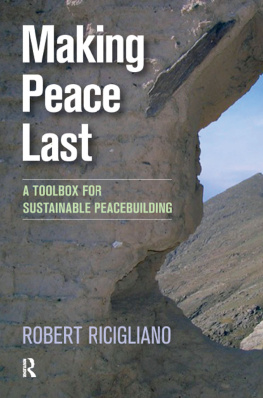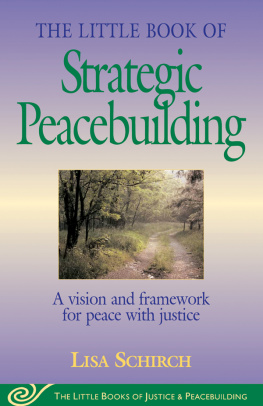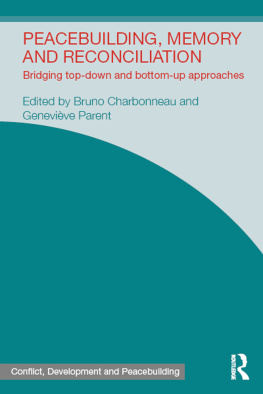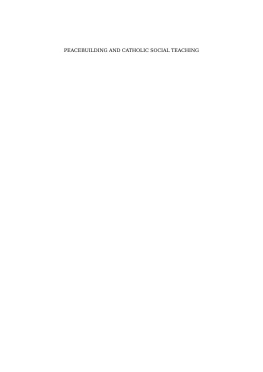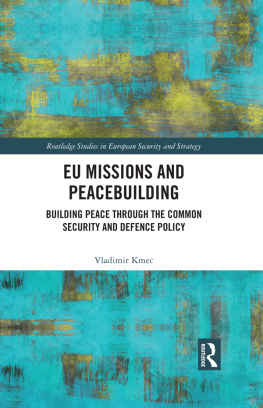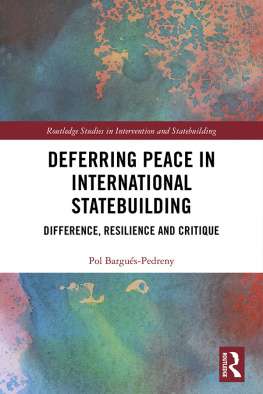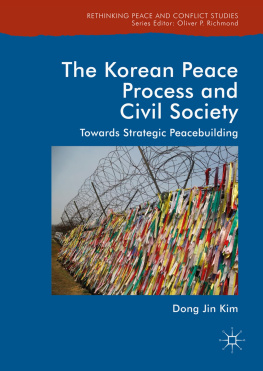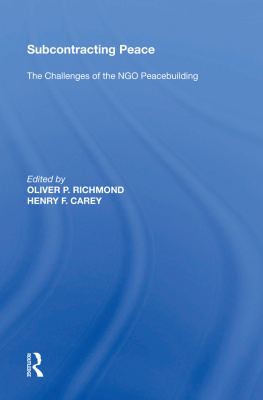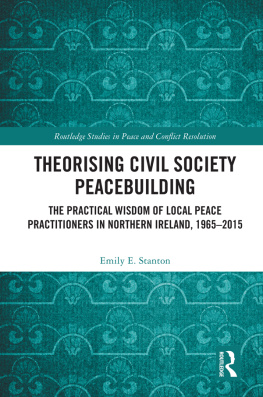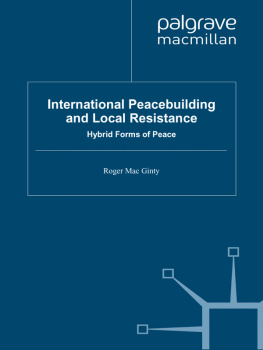MAKING PEACE LAST
MAKING PEACE LAST
A Toolbox for Sustainable Peacebuilding
Robert Ricigliano
First published 2012 by Paradigm Publishers
Published 2016 by Routledge
2 Park Square, Milton Park, Abingdon, Oxon OX14 4RN
711 Third Avenue, New York, NY 10017, USA
Routledge is an imprint of the Taylor Francis Group, an informa business
Copyright 2012, Taylor & Francis.
All rights reserved. No part of this book may be reprinted or reproduced or utilised in any form or by any electronic, mechanical, or other means, now known or hereafter invented, including photocopying and recording, or in any information storage or retrieval system, without permission in writing from the publishers.
Notice:
Product or corporate names may be trademarks or registered trademarks, and are used only for identification and explanation without intent to infringe.
Library of Congress Cataloging-in-Publication Data
Ricigliano, Rob.
Making peace last / Robert Ricigliano.
p. cm.
Includes bibliographical references and index.
ISBN 978-1-59451-994-9 (hbk. : alk. paper) ISBN 978-1-59451-995-6 (pbk. : alk. paper)
1. Peace-building. 2. Peace-buildingMethodology. I. Title.
JZ5538.R54 2012
303.66dc23
2011024726
Designed and Typeset by Straight Creek Bookmakers.
ISBN 13 : 978-1-59451-994-9 (hbk)
ISBN 13 : 978-1-59451-995-6 (pbk)
If it takes a village to raise a child, it takes multiple systems to write a book. As such, I need to thank those people who make up the systems around me. First, there is my most important system, my family: my mom and dad; my wife, Kris; and our kids, Will, Greta, and Annie. Without this system, I would not be here.
I also depend on and benefit from multiple and overlapping professional networks. First, I need to thank Julilly Kohler and the J. M. Kohler Foundation, which provided a generous writing grant. Quite simply, this book would not exist without Julilly.
Without the cooperation and support of my colleagues at the University of Wisconsin, Milwaukee (UWM), my writing leave would not have happened. Specifically, Susan Yelich Biniecki, Doug Savage, Nicole Palasz, and Rachel Schrag all did double duty for the seven months I was away from the Institute of World Affairs. Also instrumental were Patrice Petro, vice provost for International Education, Sara Tully, Larry Borchardt, and Bob Beck at the Center for International Education. In addition, Patrice was a wise counselor who helped me get through my toughest writing challenges. I also needed the advice and support of Nancy Burrell, chair of the Communication Department at UWM (my academic home), and Mike Allen. Nathan England and Drew Zoromski, graduate students in the department, and Ellen Lindeen, a former student, were also instrumental in producing this book.
Last, but not least, dozens of colleagues tolerated, supported, and instructed me as I learned many lessons about peacebuilding. I apologize for only being able to single out a few of these people. I especially need to thank Roger Fisher of Harvard Law School, who ignited my interest in negotiation and started my career in peacebuilding. Mary Anderson, founder of the Collaborative for Development Action, is also an inspiration. Marys willingness to confront, reasonably and intelligently, potentially unpleasant truths about our field set me on the path to writing this book.
I owe a debt to David Stroh, who introduced me to systems thinking. Diana Chigas and Peter Woodrow instructed, assisted, and sustained me through this journey. Similarly, I relied on advice and support from Doug Stone, Sheila Heen, Michael Moffitt, Andrea Schneider, Chip Hauss, and Dan Snodderly. Cynthia Irmer (US Department of State) and Tjip Walker (US Agency for International Development), as well as Peter and Diana, were instrumental in developing many of the ideas in this book. Chic Dambach, former president of the Alliance for Peacebuilding, is a great friendnuf said. I am particularly indebted to Ambassador Peter Galbraith for coming up with the title of this book. Lastly, I need to thank my colleagues from Harvard Negotiation Project, Conflict Management Group, and Mercy Corps.
And there could be no book without a publisher, and I am grateful for Jennifer Knerr and her colleagues at Paradigm Press, who saw the distinctive aspects of this book and were creative in accommodating and capitalizing on them. Also, thanks to the Rishi Tea Company of Milwaukee, which provided most of the caffeine I ingested during my hours of writing.
This book is far from perfect, but if it helps make peace last, I owe it to all of you.
The fault, dear Brutus, is not in our stars,
But in ourselves, that we are underlings.
Cassius, Julius Caesar (I, ii, 140141)
This book is an attempt to apply insights from systems thinking to spark a revolution in the sustainability and cost-effectiveness of efforts to build a more peaceful, just, and secure world. It represents a personal journey as much as an intellectual one. I will try to limit the personal stories to those that make the intellectual argument more comprehensible and to discuss the technical side in ways that are accessible to those outside these specific fields. I am sure I will at times fail at both, but bear with me as I pick up the journey
In the summer of 1995, in the middle of a crowded airplane traveling toward a destination halfway around the world, I spotted a young woman nuzzling her infant son. Most people would smile at this. I cried. Two months earlier, my wife and I had had our first child. When I saw the woman and her son on the plane, I realized that I was speeding away from the two people I loved the most.
Why was I doing this? Traveling abroad was a regular feature of my job doing conflict resolution work, or what some might call peace work, but now it seemed too great a sacrifice. Then I thought about others I have worked with in places like Colombia or the former Soviet Union and what they had sacrificed to improve their lives and their societies. I thought about the activist in South Africa in 1993 who was assassinated simply for attending a workshop on negotiation that I helped conduct. What motivates people to make these sacrifices? I thought about the fact that what kept me going was a belief that the great problems of the worldwar, poverty, and injusticewere formidable, but they were within our grasp as humans to affect. Cassiuss lament in Julius Caesar is both a criticism and an opportunitybecause the current situation is our fault and not our fate; we have the power to change it. This was what I needed to be able to say to my family. We can make the world a better, more peaceful place.
Unfortunately, events of the late twentieth and early twenty-first centuries have provided ample evidence to prove my optimism unfounded. In July 2004, the US government took the unprecedented step of labeling the violence in Darfur, Sudan, as a genocide. Still, the suffering there continued. The Democratic Republic of Congo witnessed what has been labeled the worlds worst humanitarian tragedy (5.4 million dead between 1998 and 2007). Wars raged in Iraq (over 2 million displaced people, perhaps 1 million dead) and Afghanistan against the backdrop of an increasing global terrorist threat. These followed on the heels of 800,000 killed in the Rwandan genocide (1994) and ethnic cleansing in Bosnia (early 1990s) and Kosovo (1999). Suffering continues in Somalia, Haiti, Israel-Palestine, Colombia, Zimbabwe, and elsewhere. This history provides ample support for the view that the prospect of peace in our time is as bleak as ever.







